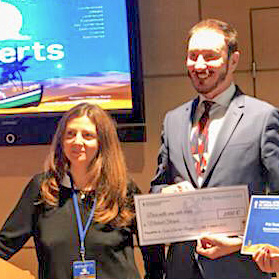By Mary Braswell
Powerful experiences on some of the world’s great rivers deepened Jinglan Lin’s desire to shape the policies that affect the planet.
Two weeks rafting on the Colorado during high school led to summers volunteering on China’s Mekong. Now, she’s in the city on the Seine — Paris, where Lin is spending the year as part of the first group of students accepted to a unique dual-degree program pairing UCLA Luskin Urban Planning with the top European research university Sciences Po.
At the end of the two-year program, Lin will emerge with a master of regional and urban planning from UCLA and a master of governing the large metropolis from Sciences Po’s Urban School. Her concentration is environmental analysis and policy.
“The rafting trip was 14 days on the river without the internet, and it really changed me,” Lin recalled.
With her eyes opened to the beauty of the wild rivers and the environmental perils they face, she planned a course of study that led to the field of urban planning because, she said, “It’s the human activities in cities that are creating all these environmental problems.”
Lin is one of six students completing the dual-degree coursework in Paris after spending a year on the UCLA campus.
The selective program is just one of the study-abroad opportunities available at UCLA Luskin:
- This year, public policy students can be found at the Hertie School of Governance in Berlin and the Graduate School of Public Policy at the University of Tokyo.
- Seven student fellows traveled to low- or middle-income countries or worked with international agencies in the summer of 2022 in association with Global Public Affairs, which is open to students from all of the School’s graduate programs. Founded in 2014, the Global Public Affairs program typically awards about 20 certificates to graduating master’s degree recipients each year. (Plans are in the works to expand the number of international-focused course offerings, with an associated increase in faculty who focus on global issues.)
- And the Public Affairs undergraduate program encourages majors, pre-majors and minors to broaden their perspectives through the UCLA International Education Office. Over the summer, 15 UCLA Luskin undergrads completed internships in Argentina, Colombia, Great Britain, South Africa and Vietnam.
The new partnership between the Luskin School and Sciences Po — the UC system’s first graduate dual-degree program with a foreign university — grew out of a longstanding quarter-long exchange program that is still available to urban planning students.
“Students are able to experience two world-class programs, which are complementary and different, as well as two world cities, which are similar in their economic and world importance but totally different in terms of their ways of life,” said Michael Storper, a distinguished professor of urban planning who has appointments at both campuses.
“Over time, we will build deeper ties of teaching and research, and this will strengthen both of our universities.”
While Lin initially had qualms about joining the dual-degree program in its very first year, she could not pass up such a rare opportunity to immerse herself in two great metropolises.
Lin, whose hometown is Guangzhou, China, is no stranger to study abroad. She attended high school in Northern California and earned her bachelor’s in environmental analysis at Pitzer, one of the Claremont Colleges. As an undergrad, she completed an exchange program at Sciences Po and knew she wanted to return.
The Los Angeles and Paris experiences have been markedly different, Lin said. UCLA’s campus is largely self-contained, whereas attending Sciences Po’s Urban School takes her all around the city. The first-year course load is foundational and rigorous — students must satisfy MURP requirements in a single year. Her classes in Paris are emphatically global in scope, taught by professors with experience on several continents.
All instruction is conducted in English, but Lin is also studying French to fulfill a language requirement and better navigate the streets of Paris.
“I didn’t know what to expect coming into this program. But I did know that Sciences Po and UCLA already had robust planning programs,” Lin said. “I knew that, regardless, I would learn a lot.”

